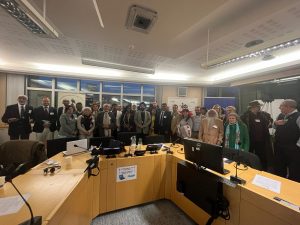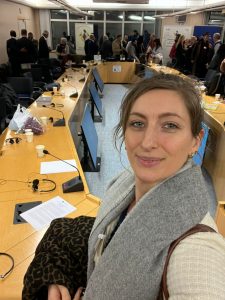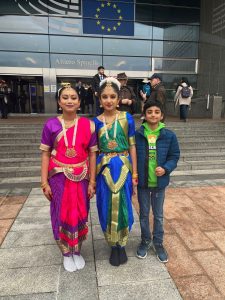EU Parliament Conference on Ayurvedic Indian Medicine
23 January 2024
Alice Roberts – first published 26 January 2024
As an opportunity to share the deep wisdom and knowledge of Ayurvedic Indian Medicine with the people of Lewes… you, and the efforts that world leaders, doctors, politicians and health organisations (WHO, AYUSH) are making to introduce this ancient, natural system of medicine to the UK medical systems, Alice Roberts (Studio Manager at The Unity Centre) was invited to the EU Parliament to attend a meeting held by Amarjeet Bhamra (the most authoritative representative of Ayurveda in Europe and UK and a monthly practitioner at The Unity Centre) on Tuesday 23 January 2024 to learn of its profound benefits on an individuals’ holistic health and to document its current political status in being legitimised in the UK system of medicine.
Whether or not you have heard of Ayurveda before does not matter. Hopefully, upon reading the article, you will understand how it applies to your life now, how it always has done and always will, from the moment you wake up in the morning to the moment you go to bed. And how it can fundamentally impact your relationship to your own health and wellbeing in order to prevent disease from occurring in your body in the first place rather than relying on cures handed to you by others. Ayurveda is an opportunity for you to understand yourself on a far deeper level of consciousness than just the physical world in which you live.
Ayurveda is the science of life. It originated in India 5,000 years ago from learnèd beings who were able to perceive, with high subtle awareness, the composition of elements in the human body in relation to the rest of the universe and how these different aspects of nature affect parts of our body over a lifetime. We are all comprised of a combination of elements: air, earth, space, water and fire and we tend to be dominant in one of two of these. Knowing this, these enlightened sages shared a system of wellness, herbal (holistic) medicine, yoga, meditation and dietary influences to help create balance inside of the body, physically, emotionally, mentally and spiritually. Therefore, the foods you eat may or may not be in favour of your individual composition and therefore may or may not be giving you the fullness in well-being and vitality that you are capable of and deserve. Ayurveda will help teach you about this and hopefully empower you to take control of your own health. The language, in Sanskrit, directly translates as ‘Ayur; meaning ‘life’ and ‘Veda’ meaning ‘knowledge.’ Therefore, Ayurveda simply means ‘knowledge of life’, of which we are all a part.
 If you had to rate your current health on a scale of 1 to 10, 1 being extremely poor and 10 being strong, where would you put yourself? This is often a question we are asked on medical forms at a doctor’s surgery, or whilst awaiting an alternative therapy treatment, such as massage. But how often do we question why our health is the way it is? And how much responsibility are we taking for our own health instead of outsourcing it to other people? Gayatri Puranik, from Germany states quite simply that, “when you take an allopathic tablet, you are taking a taxi on your health. When you follow Ayurvedic practice, you’re learning to drive your own car.” Ayurvedic principles simply come down to: what do you eat, and when do you eat? Ayurvedic practitioners want to talk about health, not just disease, and this was clearly evident in the EU Parliamentary meeting earlier this week. The main objective of the “AYURVEDA: THE SCIENCE OF LIFE – Roadmap 2021 – 2027” initiative at the EU Parliament on Tuesday 23 January in Brussels was to establish legitimacy and enhance visibility of the ancient medical system of Ayurveda at the European policy level. The initiative aimed to promote research and practice on Ayurveda and provide a scientific platform for policy makers to make informed decisions for the health of European citizens.
If you had to rate your current health on a scale of 1 to 10, 1 being extremely poor and 10 being strong, where would you put yourself? This is often a question we are asked on medical forms at a doctor’s surgery, or whilst awaiting an alternative therapy treatment, such as massage. But how often do we question why our health is the way it is? And how much responsibility are we taking for our own health instead of outsourcing it to other people? Gayatri Puranik, from Germany states quite simply that, “when you take an allopathic tablet, you are taking a taxi on your health. When you follow Ayurvedic practice, you’re learning to drive your own car.” Ayurvedic principles simply come down to: what do you eat, and when do you eat? Ayurvedic practitioners want to talk about health, not just disease, and this was clearly evident in the EU Parliamentary meeting earlier this week. The main objective of the “AYURVEDA: THE SCIENCE OF LIFE – Roadmap 2021 – 2027” initiative at the EU Parliament on Tuesday 23 January in Brussels was to establish legitimacy and enhance visibility of the ancient medical system of Ayurveda at the European policy level. The initiative aimed to promote research and practice on Ayurveda and provide a scientific platform for policy makers to make informed decisions for the health of European citizens.
The meeting started with the French host, Maxette Pirbakes, MEP for France, advocating the need for Ayurvedic practices to merge with western scientific understanding to provide legitimacy and strengthen its awareness in the European medical systems as having evidence-based premise in preventing and curing illness. Maxette, traditionally a farmer, provided a passionate perspective on the value that natural, plant-based approaches to health can have as an integrative medicine with the western systems and that it is already what many European leaders want. The focus is now on how this traditional Indian medicine can be proven as a means of healing in the recognised medical systems as opposed to just a current form of alternative medicine paid for by members of the public. Following Maxette was Amarjeet Bhamra who outlined the anticipated outcomes of the meeting as some of the following: having regard to promoting the integration of Ayurveda into the European Union national health systems; having regard that the WHO recognises Ayurveda’s ethos and value in humanity as a preventative and curative treatment for a wide range of health solutions; having regard to the unique conglobation between the UK and India where the minister of AYUSH is financing a research study on Ayurveda on the recovery in long-covid.
 Some further comments from Ayurveda practitioners continued in the same committed fashion. That according to NICE guidelines on a clinical trial with over 15,000 people, Dr Anjali Joshi from the UK, stated that Ayurveda was the first chosen treatment for lower back pain, sciatica and various cancers, some rare in the UK. Additionally, Dr Christian Kessler, from Germany, provided evidence for nearly 40% of German citizens recognising Ayurveda as an Indian Medicine, a lesser number perceiving it as solely nutrition, spices, massage and wellness. These statistics provided great confidence in the practice’s identification in European countries, many people from whom pay for Ayurveda consultations and treatments with highly-skilled practitioners, as they are finding the western medicines are simply not working or, even worse, aggravating their conditions. This is not to disregard other western practices, however, (I, for one, come from an entire family of five NHS doctors, consultants and nurses working in cities in varying roles across the UK and have great respect for the training, skills and expertise required for their roles.) What Ayurveda offers, that differs from the western medical systems, is a preventative approach where an individual takes their health into their own hands before illness occurs.
Some further comments from Ayurveda practitioners continued in the same committed fashion. That according to NICE guidelines on a clinical trial with over 15,000 people, Dr Anjali Joshi from the UK, stated that Ayurveda was the first chosen treatment for lower back pain, sciatica and various cancers, some rare in the UK. Additionally, Dr Christian Kessler, from Germany, provided evidence for nearly 40% of German citizens recognising Ayurveda as an Indian Medicine, a lesser number perceiving it as solely nutrition, spices, massage and wellness. These statistics provided great confidence in the practice’s identification in European countries, many people from whom pay for Ayurveda consultations and treatments with highly-skilled practitioners, as they are finding the western medicines are simply not working or, even worse, aggravating their conditions. This is not to disregard other western practices, however, (I, for one, come from an entire family of five NHS doctors, consultants and nurses working in cities in varying roles across the UK and have great respect for the training, skills and expertise required for their roles.) What Ayurveda offers, that differs from the western medical systems, is a preventative approach where an individual takes their health into their own hands before illness occurs.
What we can also be faced with are improper water systems that are failing to filter the damaging medical residues from other medicines that are inflicted on our ecosystems and climate that can then impact our health. Dr Ameya Krishna, from The Netherlands, revealed that male fish were found to be laying eggs due to the high level of oestrogen found in the contraceptive pill residues seeping through their water systems and soils from which plants and fish, the very food we/they eat, were being contaminated with. Astonishingly, only 10% of these medicines are actually consumed by human beings; the other 90% of it goes down into water waste.
Peter Van Straalen, another speaker for The Netherlands, stated that “Ayurveda is about health and healing and what it can do to the individual to take responsibility.” It is about giving the individual the ‘ability’ to ‘respond’ to their health; you cannot be given an ability to respond; you have to experience it yourself, then learn and grow from it. The consensus across the Ayurvedic advocates, including Isabelle Wachsmuth, representative of WHO for Geneva, Switzerland, was that Ayurveda is about ‘diversity, unity, complementary and integrative health.’ As Professor Venkata Joshi from the UK states, it is basically ‘food made into medicine.’ It cannot get more simple than that.
But it was not just our adults who were excited about promoting well-being and happiness for all. While waiting in the freezing cold, on the grey day that it was on Tuesday 23rd January, before entering the EU Parliament, I got talking to three young children from India, living in Brussels, who were there with their mother and had been asked to prepare a performance of three compositions of Bharatanatyam (a classical Indian dance) for all those present in the meeting room that day. The two twelve-year old girls were dressed in glamorous, fluorescent traditional Indian costume, with beautiful bells, bows and bhindis hidden inside their warm, winter coats. The boy, a sweet, young eight-year-old, stood dressed in warm clothes to watch his sister perform later.
 I asked all three children what they wanted to be when they were older. The first girl immediately answered, “I want to be a neurologist.”
I asked all three children what they wanted to be when they were older. The first girl immediately answered, “I want to be a neurologist.”
“Wow,” I replied, “An aspirational profession.”
The second girl jumped in next with, “I want to be a plastic surgeon.”
“Wow,” I said again, “Two very academic and respected jobs.”
Then I got to the little boy who didn’t hold back and answered, “I want to be a cardiologist.”
“Wow, all three of you want to be doctors… isn’t that great!” Then I asked the boy, “and why do you want to be a cardiologist?” To which he replied, without any hesitation and with a big smile on his face, “Because I love the heart.”
A healthy heart is a happy heart. Ayurveda seeks to balance mind, body and soul. Ultimately, it is associated with Indian medicine and its origins do come from the motherland; however, its principles, its science and its applicability are accessible to all: it belongs to everyone and offers the individual the power to take their health into their own hands. Ayurveda is not a ‘product’ to be bought in a ‘business’, Ayurveda is a way of life in which we become more conscious and in balance with ourselves. Human beings are a microcosm of the macrocosm (what is out in the universe is also in every cell in our body) so it is an opportunity to help you know who you really are and change your thinking about how you can see yourself in relation to the universe. It is the ultimate mind-body medicine. As Amarjeet puts it, “Ayurveda doesn’t just belong to India. Ayurveda belongs to the universe.” So when it comes to answering where your health is at on a scale of 1-10 and deciding on whether Ayurveda could be a life-choice for you, you can simply start with asking yourself the simple question: “Do I belong to the universe?” And the answer (in case you were wondering) is, profoundly, yes. Yes, you do.
 Amarjeet S Bhamra is available at The Unity Centre for Ayurvedic bodywork, consultations and dietary advice, two days a month.
Amarjeet S Bhamra is available at The Unity Centre for Ayurvedic bodywork, consultations and dietary advice, two days a month.


EU – European Union
UK – United Kingdom
AYUSH – Ayurveda, Yoga and Naturopathy, Unani, Siddha and Homeopathy: the six Indian
systems of medicine prevalent and practiced in India and some neighbouring Asian
countries.
WHO – World Health Organisation
NICE – National Institute for Health and Care Excellence
MEP – Member of the European Parliament
NHS – National Health Service